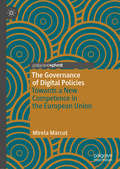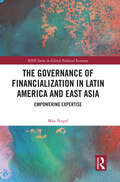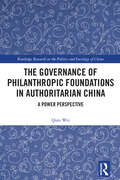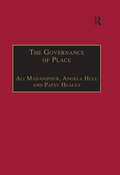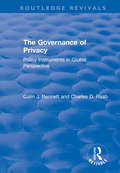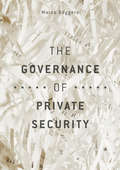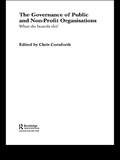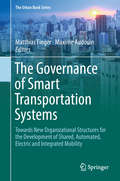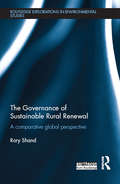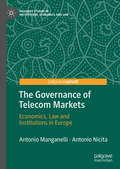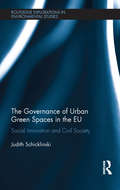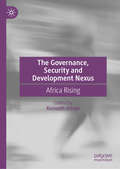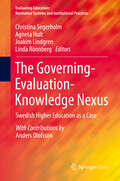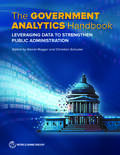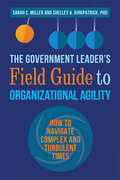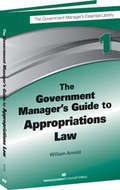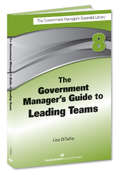- Table View
- List View
The Governance of Digital Policies: Towards a New Competence in the European Union
by Mirela MărcuţThis book examines the efforts of the European Union, both past and ongoing, to harness the socio-economic potential of the internet in public policy-making. In order to achieve this, the author delves into the interactions between actors in the process of EU decision-making, using an outlook which focuses on how both multi-level and experimentalist governance can provide solutions for digital policy governance. The book also addresses the involvement of local and regional authorities in digital policy-making, both in how they endorse decisions made at the EU level, and in how they contribute directly to digital policy-making in their own localities.
The Governance of Energy in China
by Philip Andrews-SpeedThe way in which energy is governed in China is driving its rising level of carbon dioxide emissions. This book analyses the nature of energy governance in China by combining ideas relating to transition management with institutionalist theories, which helps to identify factors which assist or constrain the country's path to a low-carbon economy.
The Governance of Financialization in Latin America and East Asia: Empowering Expertise (RIPE Series in Global Political Economy)
by Max NagelThe Governance of Financialization in Latin America and East Asia analyses how states in these areas have adopted different monetary, financial, and foreign exchange policies to govern financialization, which have induced varying levels of state control over financial markets. The book analyzes the puzzling observation of policy divergence by investigating how countries have reacted differently to major financial crises since the 1970s. It shows how Argentina and Japan selected a governance approach to financialization that followed Western prescriptions by propelling unregulated financialization; but also how Chile and South Korea, by contrast, crafted policies to reduce the negative effects of financialization on economic development and financial stability. The book identifies variegated expertise in central banks, ministries of finance, expert commissions, and research institutions that has informed policymaking across Argentina, Chile, Japan, and South Korea since the 1970s. It then demonstrates how governments have used experts to achieve diverse political objectives and explains how governments can use experts to enhance state agency to counter globalization pressures. This book will appeal to scholars of International Political Economy, comparative politics, economics, sociology, development studies, and Latin American and East Asian history. It will also be of interest to economists and policymakers who want to safeguard financial stability and promote economic growth.
The Governance of Online Expression in a Networked World
by Helena Carrapico and Benjamin FarrandIn recent years, we have witnessed the mushrooming of pro- democracy and protest movements not only in the Arab world, but also within Europe and the Americas. Such movements have ranged from popular upheavals, like in Tunisia and Egypt, to the organization of large-scale demonstrations against unpopular policies, as in Spain, Greece and Poland. What connects these different events are not only their democratic aspirations, but also their innovative forms of communication and organization through online means, which are sometimes considered to be outside of the State’s control. At the same time, however, it has become more and more apparent that countries are attempting to increase their understanding of, and control over, their citizens’ actions in the digital sphere. This involves striving to develop surveillance instruments, control mechanisms and processes engineered to dominate the digital public sphere, which necessitates the assistance and support of private actors such as Internet intermediaries. Examples include the growing use of Internet surveillance technology with which online data traffic is analysed, and the extensive monitoring of social networks. Despite increased media attention, academic debate on the ambivalence of these technologies, mechanisms and techniques remains relatively limited, as is discussion of the involvement of corporate actors. The purpose of this edited volume is to reflect on how Internet-related technologies, mechanisms and techniques may be used as a means to enable expression, but also to restrict speech, manipulate public debate and govern global populaces.This book was published as a special issue of the Journal of Information Technology and Politics.
The Governance of Philanthropic Foundations in Authoritarian China: A Power Perspective (Routledge Research on the Politics and Sociology of China)
by Qian WeiThis book is the first monograph to provide a multilevel analysis of power dynamics underlying the governance of philanthropic foundations in the authoritarian context of China. As a special kind of organization with a democratic culture, Chinese foundations’ governance is under more pressure than we realize. The government has been evolving its methods to impose stringent control over foundations (Chapter 3) and “purer” foundations highly dependent on individual donations are more likely to adopt authoritarian leadership styles rather than being mechanisms spreading democratic values in Chinese society (Chapter 4). However, this practice does not come without a price. Given power’s double-edge of both enabling and constraining effects, although strongman leaders may use their power to get things done, their power may also cause the problem of accountability (Chapter 5). Overall, Chinese society is a stable system with authoritarian power modes. This system is not static but in constant flux, homogenizing incompatible parts until all units of the system adopt the same power mode. This book establishes a comprehensive and bleak picture of the unfavorable conditions foundations in China face and provides valuable insights to understand the future of the nonprofit sector in China. This book will be of interest to students and researchers in the fields of sociology, political science, and nonprofit studies (NGO management). It will also be a valuable resource for NGP practitioners.
The Governance of Place: Space and Planning Processes
by Ali Madanipour Angela HullViews on spatial planning and its role have changed significantly over the past few years and the issues it deals with have become increasingly more complex. There are more players involved in the development of a particular area or place than ever before and there is also a greater interest in urban design issues. There are also new ways of conceiving of place, space and society relations. It is therefore necessary that all those involved in the production, consumption and valuing of places and territories develop and (re)learn new ways of analyzing and managing space. This volume provides a platform for such a re-examination. It first discusses how spaces and places are understood and conceptualized, and offers a dialogue between different approaches to the understanding of space, emphasizing the need for a dynamic perspective. The book then goes on to examine the changing governance processes through various case studies, which illustrate a range of innovative spatial planning projects from across Europe and the United States. By bringing together an examination of both space and the process through which the space is created and managed, this volume offers a unique multi-dimensional understanding of spatial planning and suggests new ways of negotiating how society should shape and influence the transformation of places.
The Governance of Privacy: Policy Instruments in Global Perspective
by Colin J. Bennett Charles D. RaabThis book was published in 2003.This book offers a broad and incisive analysis of the governance of privacy protection with regard to personal information in contemporary advanced industrial states. Based on research across many countries, it discusses the goals of privacy protection policy and the changing discourse surrounding the privacy issue, concerning risk, trust and social values. It analyzes at length the contemporary policy instruments that together comprise the inventory of possible solutions to the problem of privacy protection. It argues that privacy protection depends upon an integration of these instruments, but that any country's efforts are inescapably linked with the actions of others that operate outside its borders. The book concludes that, in a ’globalizing’ world, this regulatory interdependence could lead either to a search for the highest possible standard of privacy protection, or to competitive deregulation, or to a more complex outcome reflecting the nature of the issue and its policy responses.
The Governance of Private Security
by Marco BoggeroThis book offers new insights and original empirical research on private military and security companies (PMSCs), including China’s negotiation approach to governance, an account of Nigeria’s first engagement with regulatory cooperation under the threat of Boko Haram, and a study of PMSCs in Ebola-hit Western Africa. The author engages with concepts and theories from IR, Political Economy, and African studies—like regime, forum shopping, and extraversion—to describe what shapes state choices in national and international fora. The volume clarifies and spells out the needed questions and definitions and proposes a synthesis of how regime formation is shaped by ideas, interests, and institutions, starting from the proposition that regulatory cooperation consists in facilitating the acceptance and use of a single identifier for private military and security companies.
The Governance of Public and Non-Profit Organizations
by Chris CornforthGoverning boards play a crucial role in ensuring that public and non-profit organizations are publicly accountable and perform well. Until now, there have been relatively few detailed empirical studies of what boards do in practice, but this book fills that gap by bringing together analyses based upon some of the best recent empirical studies.Using
The Governance of Smart Transportation Systems: Towards New Organizational Structures for the Development of Shared, Automated, Electric and Integrated Mobility (The Urban Book Series)
by Matthias Finger Maxime AudouinThis book presents essential new governance structures to embrace and regulate smart mobility modes. Drawing on a range of case studies, it paves the way for new approaches to governing future transportation systems. Over the past decades, Information and Communication Technologies have enabled the development of new mobility solutions that have completely redefined traditional and well-established urban transportation systems. Urban transportation systems are evolving dramatically, from the development of shared mobility modes, to the advent of electric mobility, and from the automated mobility trend to the rapid spread of integrated transportation schemes. Given the disruptive nature of those new mobility solutions, new governance structures are needed. Through a series of case studies from around the world, this book highlights governance and regulatory processes having supported, or sometimes prevented, the development and implementation of smart mobility solutions (shared, automated, electric, integrated). The combination of chapters offers a comprehensive overview of the different research endeavours focusing on the governance of smart transportation systems and will help pave the way for this important subject, which is crucial for the future of cities.
The Governance of Sustainable Rural Renewal: A comparative global perspective (Routledge Explorations in Environmental Studies)
by Rory ShandThis book examines examples of rural regeneration projects through the public administration lens, analysing how governance arrangements in rural settings work. In particular, the author focusses on the role of communities, business and tiers of governance (local, regional, national, and supra national) in terms of delivery and funding. By drawing on a range of case studies from the UK, US, Australia and South Africa, the book identifies best practice in governance, applicable to both academic conceptual debates and to practitioners engaged in real world governance of regeneration. While there are substantial political science, sociology and geography debates within the existing academic literature around food security, fair trade, urban-rural divides and supply chains, little has been written on the way in which governance in comparative global case study settings operates in achieving or underpinning rural renewal programmes. Through the inclusion of dedicated sections in each chapter summarising both the links between academic debate and practice, this book will be of great interest to researchers and policy-makers in the field of rural development, and environmental politics and governance in general.
The Governance of Telecom Markets: Economics, Law and Institutions in Europe (Palgrave Studies in Institutions, Economics and Law)
by Antonio Nicita Antonio ManganelliThis book provides a critical comprehensive summary of the coevolution of telecom markets, rules and public institutions over the last 25 years, focusing on the challenges that regulators and policy makers have been facing. Even if the perspective of the book is European (as the EU regulatory framework is examined), most of the economic and institutional issues addressed are common to all telecom markets in advanced economies. The book addresses some traditional fundamental topics in the telecom regulation literature, as well as some hot-button topics in the current policy debate, e.g., ultrafast broadband and 5G networks, the relationship between investments and competition, the sector digitalisation and the role of OTTs. All these are relevant to students, researchers, and policy makers interested to get a sound understanding of the sector, its many dimensions and coevolutionary patterns.
The Governance of Urban Green Spaces in the EU: Social innovation and civil society (Routledge Explorations in Environmental Studies)
by Judith SchicklinskiAcross European cities the use of urban space is controversial and subject to diverging interests. On the one hand citizens are increasingly aware of the necessity for self-organising to reclaim green spaces. On the other hand local authorities have started to involve citizens in the governance of urban green spaces. While an increased level of citizen participation and conducive conditions for citizens’ self-organisation are a desirable development per se, the risk of functionalising civil society actors by the local authority for neoliberal city development must be kept in mind. Drawing on qualitative and quantitative data collected in 29 European cities from all four European geographic regions, this book examines the governance of urban green spaces and urban food production, focusing on the contribution of citizen-driven activities. Over the course of the book, Schicklinski identifies best practice examples of successful collaboration between citizens and local government. The book concludes with policy recommendations with great practical value for local governance in European cities in times of the growth-turn. This book will be of great relevance to students, scholars, and policy-makers with an interest in environmental governance, urban geography, and sustainable development.
The Governance of the Countryside
by Ian HodgeConflicts over the conservation of biodiversity, changing patterns in land use, pollution, climate change, public access and increasing demands for food and energy security lead to the creation of policies designed to reconcile interests and promote society's objectives. This book examines the origins and evolution of the institutions that determine the use and management of land and the delivery of ecosystem services, through private property rights, markets and public policies. Divided into five accessible parts, the book provides detailed coverage of the institutions, property and governance of the countryside, historical models, governance under sectoral policies and alternative approaches. It is carefully developed to meet the needs of anyone studying or interested in agricultural sciences, countryside management, rural environment and geography. Students, lecturers, policy makers, managers and consultants in these areas will find this a valuable resource.
The Governance, Security and Development Nexus: Africa Rising
by Kenneth OmejeThis edited book analyses the changing links between governance, security and development in Africa as they relate to the narrative that contemporary Africa has made remarkable progress in recent years, a phenomenon popularly known as “Africa rising.” The book presents a rigorous evaluation of the Africa rising debate and consequently offers innovative policy guidelines for Africa’s governance and development transformation.
The Governing-Evaluation-Knowledge Nexus: Swedish Higher Education as a Case (Evaluating Education: Normative Systems and Institutional Practices)
by Anders OlofssonThis Open Access book analyses the interplay between governing, evaluation and knowledge with an empirical focus on Swedish higher education. It investigates the origins, logics, and mechanisms of evaluation and quality assurance reforms and their dynamic interactions with institutional, national and European policy contexts. The chapters report findings from extensive empirical studies that offer detailed insight into the work of governing in higher education, by giving voice to actors at various levels and positions including the ministry, national agency and University employees. Central themes include the influence of European policy, changing system designs, media relations and quality assurance enactments in University institutions. The book also explores the ways in which an emerging professional cadre, labelled qualocrats, enacts and mediates evaluation and quality assurance policy and practice. Taken together, the expanding evaluation machinery in Swedish higher education highlights the pivotal role of knowledge as a governing resource, and points to special features of evaluation as a particular form of practice that makes knowledge work for governing.
The Government Analytics Handbook: Leveraging Data to Strengthen Public Administration
by Christian Schuster Daniel RoggerThe Government Analytics Handbook presents frontier evidence and practitioner insights on how to leverage data to strengthen public administration. Covering a range of microdata sources—such as administrative data and public servant surveys—as well as tools and resources for undertaking the analytics, it transforms the ability of governments to take a data-informed approach to diagnose and improve how public organizations work. Readers can order the book as a single volume in print or digital formats, or visit worldbank.org/governmentanalytics for modular access and additional hands-on tools. The Handbook is a must-have for practitioners, policy makers, academics, and government agencies. “Governments have long been assessed using aggregate governance indicators, giving us little insight into their diversity and how they can practically be improved. This pioneering handbook shows how microdata can be used to give scholars and practitioners granular and real insights into how states work, and practical guidance on the process of state-building.†? —Francis Fukuyama, Stanford University, author of State-Building: Governance and World Order in the 21st Century “The Government Analytics Handbook is the most comprehensive work on practically building government administration I have ever seen, helping practitioners to change public administration for the better.†? —Francisco Gaetani, Special Secretary for State Transformation, Government of Brazil “The machinery of the state is central to a country’s prosperity. This handbook provides insights and methodological tools for creating a better shared understanding of the realities of a state, to support the redesign of institutions, and improve the quality of public administration.†? —James Robinson, University of Chicago, coauthor of Why Nations Fail
The Government And Politics Of Israel: Third Edition
by Donald PeretzIsraeli government and politics have undergone significant changes since the second edition of this book was published in 1983. Israel withdrew from Lebanon, absorbed hundreds of thousands of new immigrants from the collapsed Soviet Union and Ethiopia, and undertook peace negotiations with the Palestinians and other Arab neighbors that led to a historic peace treaty, the Declaration of Principles. These events were made possible as a result of several institutional, legal, and normative changes in the political system.This completely revised edition of The Government and Politics of Israel offers a comprehensive and up-to-date overview of the dynamics of Israeli politics. This edition focuses on issues that have become central in the study of Israels political system, such as new electoral procedures, the formation of new parties, government administrative reorganization, fresh personalities on the national scene, and the peace process. The book is intended to familiarize those interested in Israels government with its origins; the evolution of its institutions, practices, and traditions; and the workings of the government today. }Israeli government and politics have undergone significant changes since the second edition of this book was published in 1983. Israel withdrew from Lebanon, absorbed hundreds of thousands of new immigrants from the collapsed Soviet Union and Ethiopia, and undertook peace negotiations with the Palestinians and other Arab neighbors that led to a historic peace treaty, the Declaration of Principles. These events were made possible as a result of several institutional, legal, and normative changes in the political system.This completely revised edition of The Government and Politics of Israel offers a comprehensive and up-to-date overview of the dynamics of Israeli politics. This edition focuses on issues that have become central in the study of Israels political system, such as new electoral procedures, the formation of new parties, government administrative reorganization, fresh personalities on the national scene, and the peace process. The book is intended to familiarize those interested in Israels government with its origins; the evolution of its institutions, practices, and traditions; and the workings of the government today. }
The Government Leader's Field Guide to Organizational Agility: How to Navigate Complex and Turbulent Times
by Sarah C. Miller Shelley KirkpatrickThis is the first book to fully adapt the principles of agility for government leaders who want to make their organizations more effective and nimble while better serving their public mission.This practical resource will equip government leaders at all levels with evidence-based, hands-on guidance for transforming their organizations, enabling them to better serve the public and their customers. While many books focus on organizational agility for leaders of for-profit companies, this is the first one tailored to the unique requirements government leaders face. They must find a way to accomplish their mission while navigating constant change. Government leaders at all levels must maneuver their organizations through new, often complex challenges, ranging from new laws that impact their agencies, new technologies, changes in leadership, and unexpected events. By explaining how to manage and organize work differently, this guide will help leaders weather the storm of that constant change so they can help their agencies realize their missions and serve the public interest.
The Government Manager's Guide to Appropriations Law
by William G. Arnold CDFM-AThis guide offers sound and easy-to-apply advice to help government managers deal with appropriated funds properly and legally. It follows the organization of the Redbook, the Government Accountability Office's 2,000+ page Principles of Federal Appropriations Law. Government purchase card holders and approvers will find this book especially helpful in understanding the common risks that arise and how to avoid violating the myriad rules and regulations involved.
The Government Manager's Guide to Contract Law
by Terrence M. O'Connor LLMThis practical volume offers clear and helpful guidance on the laws governing federal contracts. From information on the types of contracts used in government to ways to interpret those contracts, the book covers the basics that every government manager needs to know. Information on complying with ethics requirements in general, and in the solicitation process and contract administration in particular, is especially pertinent. The author also explains the government manager's liability both to the government and to the public.This book covers all the aspects of contract law that every government manager should know to be both effective and in compliance.
The Government Manager's Guide to Contract Negotiation
by Legette McIntyreThe Government Manager's Guide to Contract Negotiation Federal managers often find themselves at the negotiating table, charged with reaching a solid, fair deal for their agency. Now, you can gain a competitive edge in even the most difficult negotiations with time-tested, effective tactics from a noted authority on federal negotiations. This guide will help you understand the negotiation process, plan for it, develop strategies and tactics, anticipate and counter the other side's strategies and tactics, and conclude and document the negotiation. Concise, accessible, and authoritative, this book offers a veritable arsenal of winning strategies that you and your team can use in your next negotiation.
The Government Manager's Guide to Earned Value Management
by Charles I. Budd PMP Charlene S. Budd PhD, CPA, CMA, CFM, PMPThis volume presents practical guidance for the government manager on earned value management (EVM), from basic calculations to how to find the most useful information online. Emphasis is on the relevant reports that contractors are required to submit to the federal government as part of their compliance with mandated EVM on projects. Because the data submitted on reports do not translate automatically into recommendations for actions to be taken, information is included on how to analyze and evaluate contractor reports. This book is a must-read for understanding EVM on government projects.
The Government Manager's Guide to Leading Teams
by Lisa DiTullioBuilding and leading teams that ensure project success may not be easy, but the techniques involved are straightforward and workable. Lisa DiTullio demonstrates that enhancing team dynamics to improve performance in the federal environment does not have to be complicated or time-consuming. Her time-tested best practices, tips, and processes will help any government manager develop and lead a better team.
The Government Manager's Guide to Plain Language
by Judith G. Myers PhDThe ability to write well correlates highly with the ability to think well—to analyze information, weigh alternatives, and make decisions. Government managers must make instructions and policies clear to employees, give effective presentations, and communicate effectively with the public. In addition, government managers must model clear, effective writing for their staffs. A comprehensive chapter on using social media effectively and appropriately is included.
